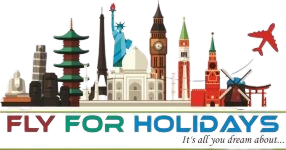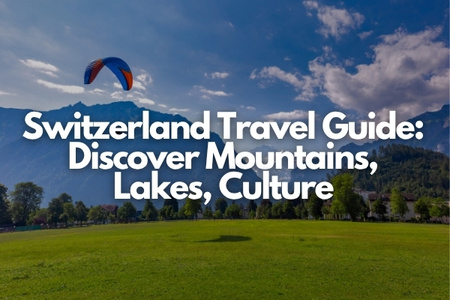Switzerland Travel Guide: Discover Mountains, Lakes, Culture
Switzerland – the land of serene lakes, towering Alps, charming medieval villages, and world-class chocolate – has become a dream destination for travelers from across the globe. Whether you seek adventure, culture, history, or relaxation, Switzerland offers something for everyone. This comprehensive guide will help you plan the ultimate Swiss getaway, exploring the best attractions, activities, food, and tips for your Swiss adventure. To enter your dream destination you will need switzerland visa for that contact trusted agent for a smooth and hassle free visa application process such as Fly For Holidays
Let Our Switzerland Visa Experts Call You
Why Visit Switzerland?
Switzerland offers a seamless blend of natural beauty, modern infrastructure, and rich history. Its well-maintained cities, peaceful countryside, and pristine nature make it a haven for travelers. Whether you’re an adrenaline junkie, a history enthusiast, or a lover of fine food, you’ll find plenty of reasons to fall in love with Switzerland.
Key Highlights of Switzerland:
- Majestic Alps: A paradise for winter sports, hiking, and breathtaking views.
- Picturesque Lakes: Crystal-clear lakes surrounded by mountains.
- Charming Villages: Historic villages that feel like something out of a fairy tale.
- Rich Cultural Heritage: Swiss museums, art galleries, and architectural gems.
Top Destinations to Explore in Switzerland
Switzerland is a small country, but its diverse landscape offers something for every traveler. Let’s dive into the must-visit destinations.
Zurich: Switzerland’s Global Metropolis
Zurich, Switzerland’s largest city, is a cultural and financial hub. Known for its efficient public transport, lively art scene, and high-end shopping, Zurich is perfect for travelers seeking both cosmopolitan experiences and scenic beauty.
- Visit Old Town (Altstadt): Explore the narrow cobbled streets, historical buildings, and charming boutiques.
- Lake Zurich: Enjoy a boat ride or take a relaxing walk along the shores for stunning views of the Alps.
Interlaken: Adventure & Nature
Nestled between Lake Thun and Lake Brienz, Interlaken is a paradise for adventure lovers. Surrounded by the Jungfrau Mountains, it offers an ideal base for outdoor activities such as paragliding, skiing, and hiking.
- Harder Kulm: Take the funicular to the viewpoint for panoramic views of the mountains and lakes.
- Hiking: Explore trails around the lakes or ascend the famous Schilthornor Jungfraujoch.
Lucerne: The Heart of Switzerland
Lucerne is a picturesque city that lies on the shores of Lake Lucerne, surrounded by snow-capped mountains. The city’s medieval architecture and cobbled streets make it feel like you’re stepping into a fairy tale.
- Chapel Bridge: Visit the historic wooden bridge with painted panels.
- Mount Pilatus: Take a cable car to the top for panoramic views of the city and the Alps.
Zermatt: Home to the Iconic Matterhorn
Zermatt is best known for the Matterhorn, one of the most iconic mountains in the world. The town offers a range of skiing options and is car-free, creating a serene atmosphere for visitors.
- Skiing and Snowboarding: Zermatt is a top destination for winter sports enthusiasts.
- Matterhorn Glacier Paradise: Take a cable car up to the highest cable car station in Europe.
Montreux: The Gateway to Lake Geneva
Montreux is a charming lakeside town on Lake Geneva, renowned for its annual jazz festival and scenic beauty.
- Château de Chillon: Explore this stunning lakeside castle.
- Lavaux Vineyards: Take a stroll through the terraced vineyards overlooking the lake.
Best Activities to Do in Switzerland
Switzerland is a playground for nature lovers and adventure seekers. Here are some of the best activities to try:
Skiing and Snowboarding
- Switzerland’s Alps are a paradise for winter sports. Zermatt, St. Moritz, and Verbier are among the most popular ski resorts, offering world-class slopes, off-piste areas, and stunning alpine views.
Hiking and Trekking
- During the summer months, Switzerland transforms into a hiker’s paradise. Trails like the Swiss National Park offer majestic views, wildlife encounters, and a chance to disconnect in nature.
Boat Cruises on Swiss Lakes
- Take a boat cruise on the serene Lake Geneva, Lake Lucerne, or Lake Thun to experience Switzerland’s breathtaking landscapes from the water.
Scenic Train Journeys
- Switzerland is home to some of the world’s most scenic train journeys. The Glacier Express and Bernina Express offer panoramic views of the Swiss Alps, glaciers, and deep valleys.
Swiss Cuisine You Must Try
Swiss food reflects the country’s cultural diversity, with influences from French, German, and Italian cuisines. Here are some must-try dishes:
Fondue
- Melted cheese served with bread cubes, vegetables, and meats. Swiss fondue is a popular comfort food, especially in colder months.
Raclette
- Melted cheese scraped over boiled potatoes, pickles, and onions. It’s a classic Swiss dish enjoyed across the country.
Swiss Chocolate
- Switzerland is synonymous with fine chocolate. Visit chocolate factories like Lindt or Cailler for a taste of Swiss chocolate-making heritage.
Rösti
- A traditional Swiss potato dish, usually served with a variety of toppings such as eggs, cheese, or bacon.
Travel Tips for Switzerland
To make the most of your Swiss adventure, here are some helpful travel tips:
- Best Time to Visit Switzerland
- Winter (December to March): Ideal for skiing, snowboarding, and winter sports.
- Summer (June to September): Perfect for hiking, cycling, and outdoor activities.
- Currency and Payment
- Switzerland uses the Swiss Franc (CHF). Credit cards are widely accepted, but it’s always a good idea to carry some cash.
- Transportation
- Swiss Travel Pass: This pass offers unlimited travel on the Swiss Travel System network, including trains, buses, boats, and even some mountain excursions.
- Swiss Railways: Switzerland’s train network is one of the best in the world. Trains are efficient, clean, and offer stunning views along the way.
- Language
- The four official languages in Switzerland are German, French, Italian, and Romansh. English is widely spoken, especially in tourist areas.
Conclusion: Why Switzerland Should Be Your Next Travel Destination
Switzerland’s timeless beauty, rich culture, and outdoor adventures make it a top destination for every traveler. Whether you want to hike the iconic Alps, explore historic cities, or indulge in world-class Swiss chocolate, this country will exceed your expectations.
Plan your trip to Switzerland today and immerse yourself in one of the most beautiful and diverse destinations in Europe.
For skiing and winter activities, visit in winter(December to March). For hiking, outdoor adventures, and scenic beauty, visit during summer (June to September).
Switzerland is part of the Schengen Area, so check the visa requirements based on your nationality. Many travelers from the EU, US, and Canada can visit without a visa for up to 90 days.
Yes, Switzerland can be expensive, especially in cities like Zurich and Geneva. However, you can save by using public transportation, staying in hostels, and choosing budget-friendly activities.
Switzerland has an extensive public transportation network, including trains, buses, boats, and trams. The Swiss Travel Passis highly recommended for tourists as it provides unlimited travel on most public transport, including scenic trains like the Glacier Express and Bernina Express. Many cities also offer bike-sharing programs for a more eco-friendly way to explore.
Yes, Switzerland is considered one of the safest countries in the world for travelers. It has a very low crime rate, and its public transport system is reliable and secure. As always, exercise general caution, especially in busy tourist spots, and keep an eye on your belongings.
While Switzerland is often considered an expensive destination, it’s possible to travel on a budget. You can save by staying in hostels, booking tickets for attractions in advance, eating at local eateries, and using the Swiss Travel Pass for discounted transportation. Supermarkets like Coopand Migros offer affordable meal options.
Yes, Switzerland offers a variety of vegetarian and vegan-friendly options. Many Swiss restaurants cater to different dietary needs, and you can easily find plant-based meals such as vegetable rösti, salads, and vegan fondues. Big cities like Zurich and Geneva have plenty of dedicated vegan restaurants.
The ideal duration of your trip depends on your interests. If you want to explore a few major cities and natural wonders, 7-10 daysshould be enough. If you plan to do in-depth exploration, including outdoor activities like skiing or hiking, 10-14 days would be more suitable.
Yes, credit and debit cards are widely accepted in Switzerland, especially in cities and tourist destinations. However, some small shops, markets, or rural areas may only accept cash. It’s a good idea to have some Swiss Francs on hand for these situations.
Absolutely! Switzerland is a fantastic destination for families, offering family-friendly activities such as boat rides, nature walks, and visits to interactive museums. Many resorts and towns cater to families, and activities like skiing and hiking are suitable for children of all ages.
While not mandatory, travel insuranceis highly recommended. It can cover unexpected expenses like medical emergencies, trip cancellations, or lost luggage. Health insurance is especially important in Switzerland, where medical costs can be high without coverage.
To experience Swiss culture, visit local festivals, explore quaint villages, try Swiss cheese and chocolate, and learn about Swiss history and customs. The Swiss Museums Passallows you access to over 500 museums across the country. Also, don’t miss out on experiencing Swiss hospitality, such as visiting a local mountain hut or participating in a fondue night with locals.
As of now, Switzerland follows EU regulations regarding COVID-19 travel protocols. Always check the latest entry requirements before booking your trip, as regulations may change. Switzerland also has strict environmental policies, so you may be encouraged to travel sustainably during your stay.
To find the best hotel deals in Switzerland, consider booking early and using booking websites like com, Airbnb, or HotelAdvisor. Also, look for off-season rates(spring and autumn) to avoid high prices in peak tourist months (July and August).
The official currency of Switzerland is the Swiss Franc (CHF). While many places accept credit cards, it’s recommended to carry some Swiss Francs, especially in smaller towns or rural areas where cash might be preferred.
Switzerland has excellent mobile coverage and internet access. You can buy SIM cardswith data plans from stores like Swisscom, Sunrise, or Salt. Many hotels, cafes, and public places offer free Wi-Fi, so staying connected won’t be a problem.
Switzerland has four official languages: German, French, Italian, and Romansh. The majority of the population speaks German, especially in the central and eastern parts. Frenchis spoken in the western region (Geneva and Lausanne), and Italian is used in the southern region of Ticino. English is widely spoken, especially in larger cities and tourist areas.
Tipping is not compulsory in Switzerland, as service charges are generally included in bills. However, if you receive exceptional service, it’s customary to leave a tip of about 5-10%in restaurants or cafes. Rounding up the bill for taxi rides or small amounts is also common.
Switzerland is very eco-conscious and has strict environmental laws. It is known for its clean streets, efficient recycling system, and commitment to sustainability. Many hotels and restaurants use eco-friendly practices, and Switzerland encourages visitors to minimize their carbon footprint during travel.
Yes, Switzerland has one of the most efficient and reliable public transport systems in the world. Trains, buses, boats, and even funiculars connect all the major towns and cities. You can easily explore Switzerland without a car, and many cities like Zurich and Geneva are walkable and easy to navigate.




Comment (0)